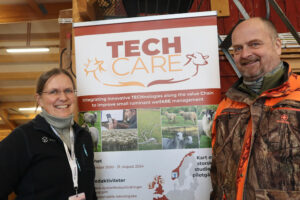– by L. Grøva (NIBIO)

In the TechCare-project, mastitis, parasites, and agonistic behavior are pointed out as important factors influencing the welfare of dairy goats. Also, lameness and health issues in general are on the list of welfare issues that dairy goat farmers are keen to be able to detect at an early stage. In Norway, a pilot study on dairy goats and the use of existing and new technology for early detection of health and welfare issues started in 2022 and is ongoing. The goat pilot is conducted in close cooperation with Storsteigen College School in Alvdal. Their dairy goats graze on the mountain farm Meløya in Einunndalen in summer, together with goats from the Livestock Production Research Centre at the NMBU University in Ås. Technology, i.e., an electronic ear-tag, a motion sensor and/or a GPS-collar, can provide information on the animal’s position and level of activity in real time. This has potential to provide the farmer with knowledge on the behavior of each animal, and thus being able to attend to goats that are not healthy and fit. From the tech in the goat pilot, we can get information on distance walked by each animal. If an animal changes its own normal behavior over time, this may indicate that there is a health and welfare issue. Also, these data may provide information on the specific behavior of the goat such as running, ruminating, drinking, walking and standing still. Information on individual behavior in goats – and changes in behavior – can provide an early warning system on health issues. Connecting animal-based sensors that provide individual behavioral information with data from milk meters and weather data may in the future give us more precise information about the wellbeing of the goats – in real time. The Norwegian dairy goat pilot will be extended to run also in June – August 2023. Enjoy the interesting video!

